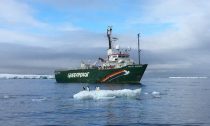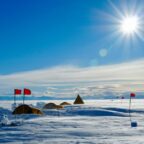
The overwhelming majority of krill companies are to stop fishing in vast areas of the Antarctic Peninsula. Krill are important because they are at the base of the food chain: whales, penguins, seals and squid all eat the tiny, shrimp-like crustaceans. Other species, such as albatross and killer whales are indirectly dependent.
The decision of the krill fishing companies comes ahead of a meeting of the Antarctic Ocean Commission (CCAMLR).
The summit in October will decide whether to adopt an EU proposal to create the biggest ocean reserve on Earth.
The Antarctic Ocean Sanctuary would protect 1.8 million square kilometres in and around the Weddell Sea.
The decision to stop krill fishing off the peninsula follows pressure by campaign groups, including Greenpeace.
Companies have been harvesting krill on a large scale since the 1970s. They are now fished mainly for fish-farm feed and to meet the growing demand for Omega-3 oils and other health supplements.
The animals also help to offset the effects of climate change, removing the greenhouse gas carbon dioxide from the atmosphere through their consumption of carbon-rich algae near the surface.
The companies that have made this commitment represent around 85% of the krill fishing industry in the Antarctic.
They will also support the establishment of “buffer zones” around breeding colonies of penguins, along with the scientific and political process for the creation of a network of large-scale marine protected areas around Antarctica.
Kristine Hartmann from Aker BioMarine, the largest krill-fishing company in Antarctic waters, said: “We are positive that our commitment will help ensure krill as a sustainable and stable source of healthy omega-3s for the future… through our commitment we are showing that it is possible for no-fish zones and sustainable fisheries to co-exist.”
Frida Bengtsson of Greenpeace’s Protect the Antarctic campaign, commented: “The momentum for protection of the Antarctic’s waters and wildlife is snowballing.
“A huge movement of people globally has been joined by scientists, governments, celebrities and now even the companies fishing in the Antarctic. This is a bold and progressive move.”
She said the “eyes of the world” would be on those making the decision on the creation of the ocean sanctuary.
The Oscar-winning actor Javier Bardem, who recently travelled to the Antarctic with Greenpeace, said: “Thank god there’s some good news. This is amazing. What I hope that will happen is that it won’t just end up like this, it will create an echo for the future.”
Dr Phil Trathan OBE, from the British Antarctic Survey (BAS) said that the UK had made an appeal to CCAMLR in 2016 for the organisation to ban krill fishing in coastal zones around the Antarctic Peninsula. He said: “CCAMLR has yet to take such a step, so it is to be welcomed that the majority of krill companies hae decided to take these voluntary steps.”
Peter Andrews, head of sustainability at the British Retail Consortium, commented: “This will make a real difference to the protection of Antarctic waters and wildlife.”
A spokesperson for WWF said, “The accelerating impact of humanity on fragile ocean ecosystems, including from climate change, makes this commitment to Antarctic protection all the more timely.”
According to the Pew Charitable Trusts it was, “a truly visionary step that more commercial fishing interests in Antarctica and around the world should follow”.
However Dr Susanne Lockhart, Antarctic benthic specialist at the California Academy of Scientists, sounded a note of caution. She said the the announcement was great news, “but there are other industries in the region as well. We still have toothfish and icefish fisheries. To see them make the same policy would be important”.













Social Profiles